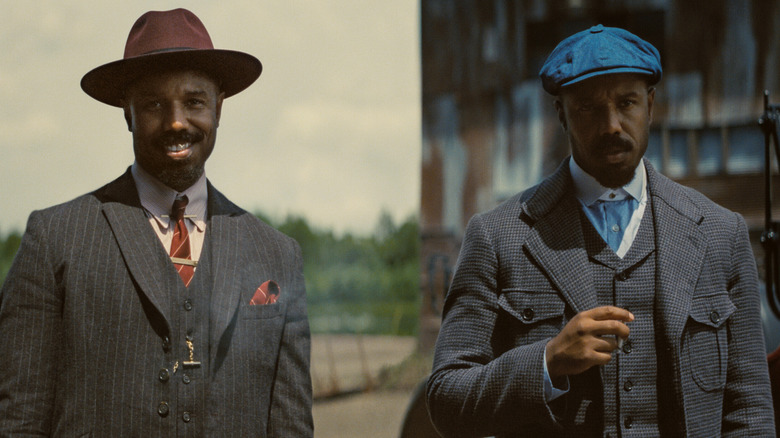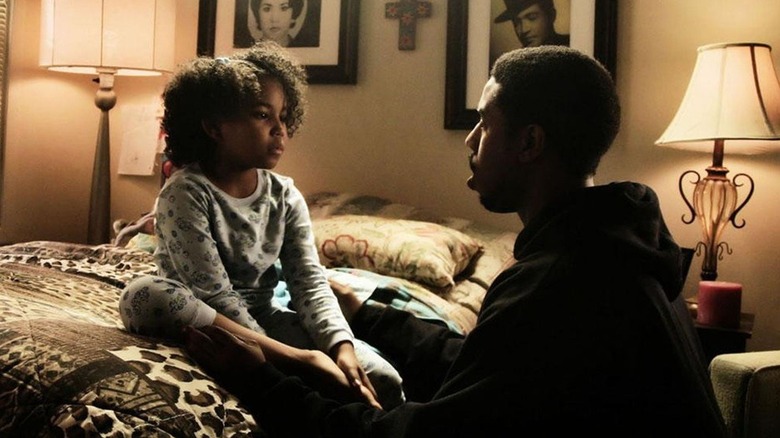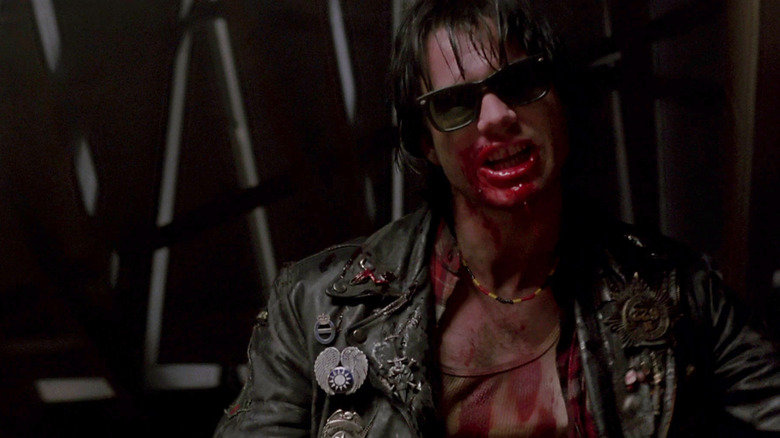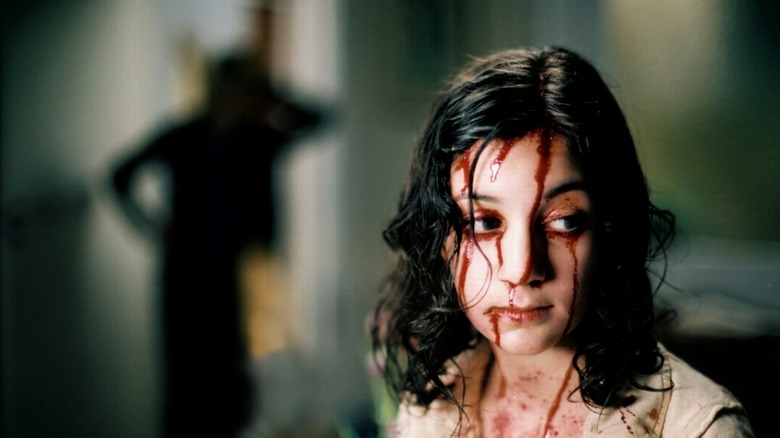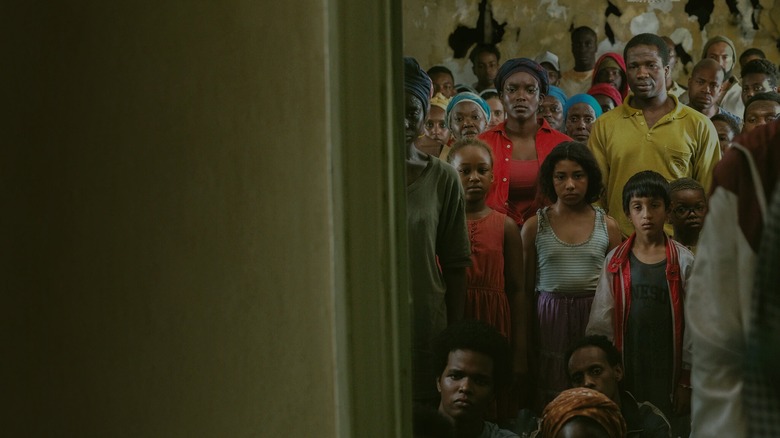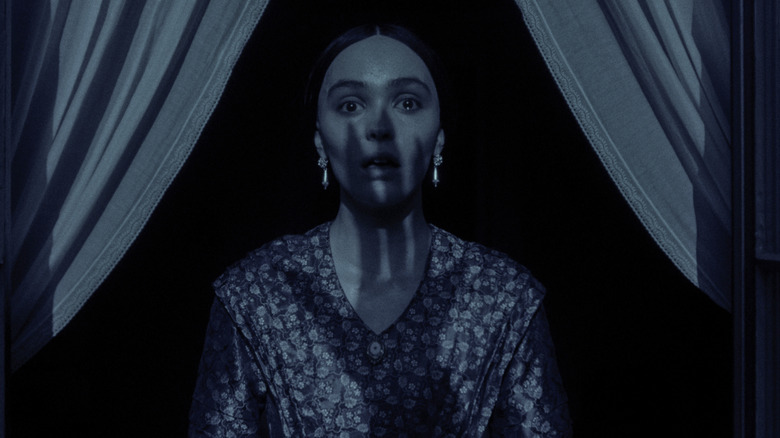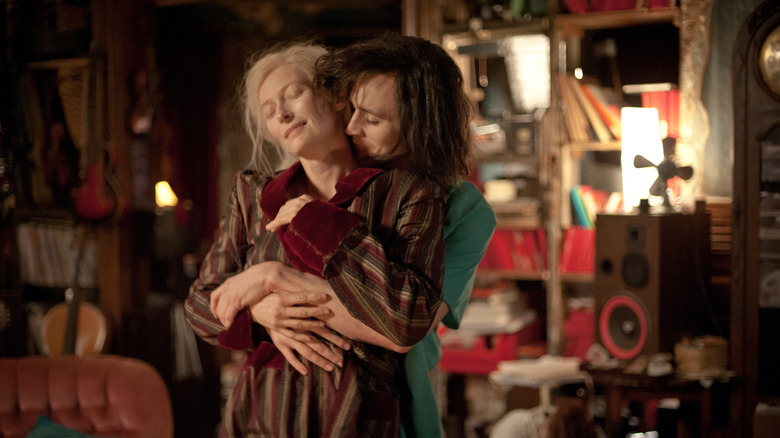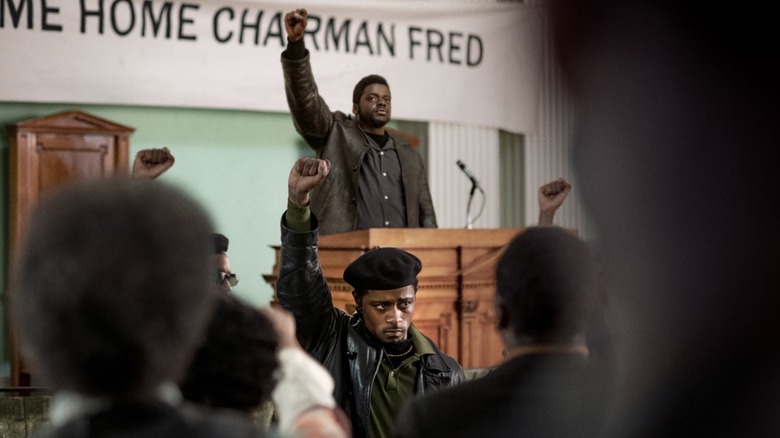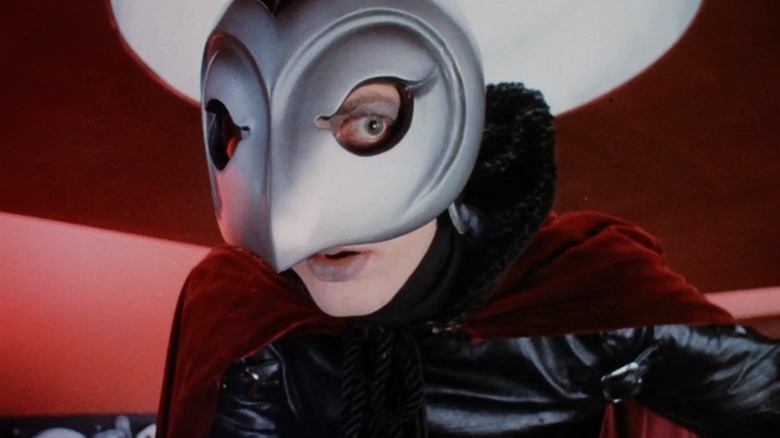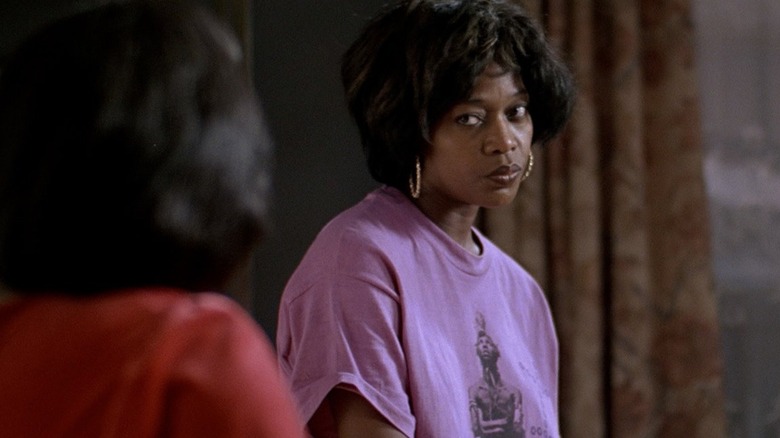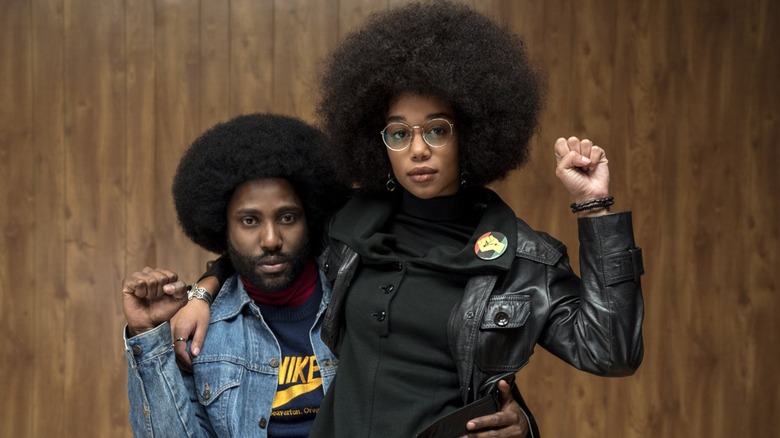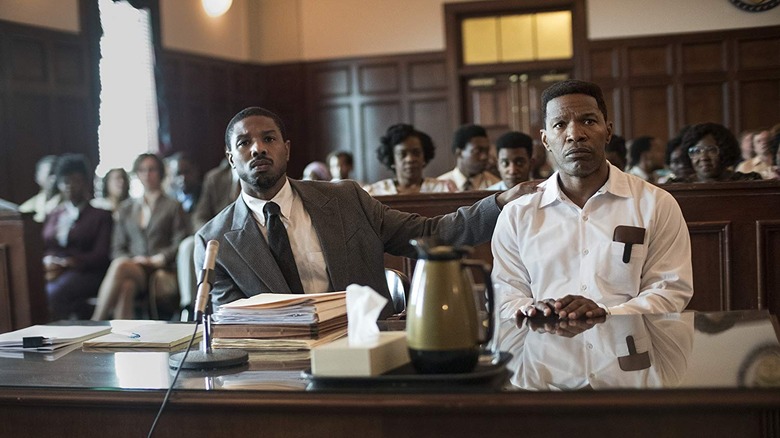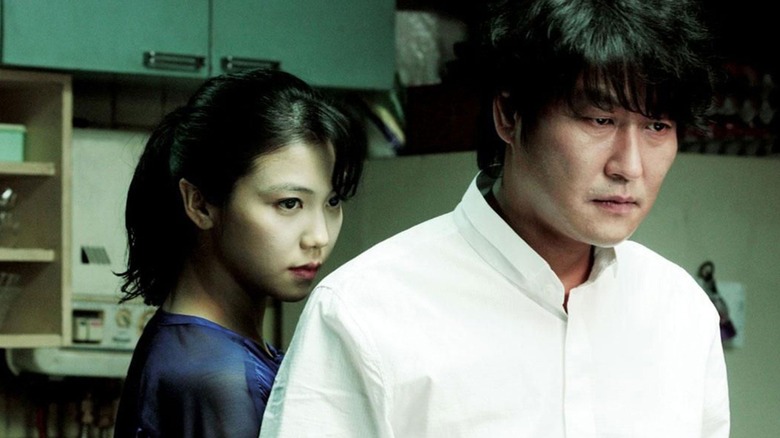12 Best Movies Like Sinners
One could spend all day and night listing the glorious virtues of director Ryan Coogler's ambitious "Sinners," which have turned the film into a pop culture phenomenon. There's a litany of memorable performances, those striking images captured on 70mm film are unforgettable, and its bravura musical sequences similarly astonish. What's especially exciting about this movie, though, is how fresh and original it is.
Not based on any pre-existing source material, "Sinners" is something completely new in American cinema. It truly doesn't feel like anything that came before it, even while following in the footsteps of other beloved subgenres like vampire movies and musicals. Though "Sinners" is a one-of-a-kind classic, that doesn't mean there aren't other movies out there with similar vibes that are must-see watches.
In fact, here are 12 movies from around the world that capture certain sensibilities of "Sinners" and provide exceptional follow-up viewing for folks who just can't get enough of them. These 12 films are great spiritual "Sinners" companions for many reasons: Some simply feature cast and crew members that were integral to making Coogler's film work, while others are also horror/musical hybrids or vampire tales. Still others make use of the Mississippi setting that's crucial to the "Sinners" aesthetic. Whatever qualities inform their artistry, these 12 movies are absolutely perfect to pair up with another "Sinners" revisit.
Fruitvale Station
"Sinners" has catapulted writer-director Ryan Coogler to a new level of notoriety, building off his incredible reputation after helming "Creed" and the two "Black Panther" movies. However, one of Coogler's greatest films remains his feature-length directorial debut: "Fruitvale Station." This 2013 indie follows a day in the life of Oscar Grant (Michael B. Jordan) in Oakland, California. In real life, this man made headlines across the planet in the nascent hours of 2009 after he was shot and killed by a police officer. Long before this unarmed human being was murdered, Grant was just another ordinary individual trying to make ends meet and be a good father.
The way Coogler makes the most mundane conversations in the first act of "Sinners" so transfixing was refined in this early effort. The unhurried pace of "Fruitvale Station" really lets the nuances of Grant's life (and the intricacies of Jordan's performance) resonate. That quality also makes the devastating ending hit extra hard. Even before he was helming major studio releases, Coogler's skills were honed tremendously with "Fruitvale Station."
Near Dark
Want more Southern vampire mayhem after "Sinners?" Director Kathryn Bigelow's 1987 movie "Near Dark" will scratch that itch and then some. The story follows Caleb Colton (Adrian Pasdar), a normal guy who is transformed into a vampire by the irresistible Mae (Jenny Wright). He's then coerced into joining Mae's ragtag group of vampires, which includes Bill Paxton as the unforgettably showy Severen. As he gets deeper into the world of vampires, Caleb is torn between the human realm and this debauchery-laden supernatural domicile.
Paxton's winning performance alone, which is rife with energy and compelling personality, is enough to merit "Near Dark" must-see status. The late "Twister" veteran was always known for giving each of his roles 110% and his "Near Dark" work is one of the most vivid displays of that gift. However, Bigelow's deft juggling of countless genres (including horror, steamy romances, and Westerns) makes "Near Dark" an exceptional rural vampire yarn like no other. Great practical effects and blood-soaked spectacle only sweeten the deal.
Bigelow may have secured her Oscars with prestigious dramas like "The Hurt Locker," but titles like "Near Dark" are where she really excels as an artist. Don't be afraid to chow down on this precursor to the Southern vampire cinema charms of "Sinners."
Let the Right One In
Growing up is hard, and those inevitable challenges are only exacerbated when you're a 12-year-old like Oskar (Kåre Hedebrant) who befriends a young girl, Eli (Lina Leandersson), who turns out to be a vampire. Director Tomas Alfredson and screenwriter John Ajvide Lindqvist (the latter adapting his 2004 novel of the same name) craft "Let the Right One In" as a simultaneously grounded exploration of adolescent turmoil and unabashedly blood-drenched vampire yarn. This seemingly paradoxical combination turns out to be quite potent, especially since Alfredson has such a good command of creating tension.
From the crunching of feet ominously stepping through the snow-covered Swedish landscapes to juxtaposing bloodstains with mundane suburban environments, "Let the Right One In" delivers plenty of uber-specific frights. This 2008 title is also a tremendous visual exercise thanks to the lensing by cinematographer Hoyte van Hoytema. Long before he worked on projects like "Oppenheimer" and "Nope," Hoytema established his chops with the striking imagery and camerawork that abounds in "Let the Right One In."
His visuals are eerie, but also richly human, and never lose sight of the young, vulnerable perspective guiding this story. A climactic shot, following Oskar in a school pool as severed limbs rain down into the water around him, perfectly crystallizes this approach. This tragic coming-of-age saga constantly delivers such unforgettable images, not to mention an ominous atmosphere you can't shake.
His House
Wunmi Mosaku's biggest movie breakthrough yet is the role of Annie in "Sinners." Mosaku delivers unforgettable work as the film's leading lady and spiritual center, lending profound heart to the production. However, this wasn't her first time anchoring a gripping horror film.
Five years before "Sinners," Mosaku headlined "His House" as Rial, who is forced to flee from South Sudan with her husband Bol (Sope Dirisu) and eventually secure shabby asylum living in London. As they struggle immensely with fitting into their new domicile, bizarre supernatural occurrences keep plaguing the duo. Writer-director Remi Weekes eventually takes "His House" to very visually stylized territory, but never loses track of the profoundly grounded and realistic struggles Bol and Rial are going through.
Many horror films with grand thematic ambitions eventually eschew all greater narrative goals for a third act full of jump scares and derivative mayhem. "His House," meanwhile, impressively balances intimate character work with unnerving chaos. The grand finale eventually works just as well on a dramatic level as it does at hitting all the climactic beats you'd want out of a horror movie. But the striking expansion in "His House" of what's "horrifying" in horror cinema is extraordinary largely because of Mosaku's captivating performance. All the endless talent she displays in "Sinners" was visible from the start in "His House."
Nosferatu
"Nosferatu" rides well-trodden narrative ground. Not only is it a remake of the 1920s F.W. Murnau classic, but its entire premise is rooted in Bram Stoker's "Dracula." Even with endless other versions of this basic story, though, "Nosferatu" is a gripping, bleak treat thanks to writer-director Robert Eggers delivering such atmospheric gusto. His 2024 take on "Nosferatu" is one rife with heightened grimy flourishes.
Even before wretched vampire Count Orlok (Bill Skarsgard) is on-screen, Ellen's (Lily-Rose Depp) existence as a normal woman in Germany is plagued with problems and restrictions. Grandiose blocking and multi-layered images pepper even the most mundane parts of her life, with those theatrical qualities becoming even more impressive once Orlok's presence is ramped up.
Gorgeous wide images of Thomas Hutter (Nicholas Hoult) navigating a dark, snowy, tree-littered terrain searching for Orlok's castle, for instance, are so glorious that they can't help but elicit a gasp. Entertaining maximalism also seeps into the bravura performances, including Willem Dafoe wringing as much intensity as possible out of his lines. Even the sound design radiates nasty precision, with all those unsettlingly gooey and crunchy sounds. Every corner of "Nosferatu" reverberates with so much idiosyncratic dedication that all prior iterations of the narrative float away from your mind. Like "Sinners," "Nosferatu" is a mesmerizing vampire yarn that builds something distinctively new out of a rich artistic history.
Only Lovers Left Alive
Folks have become enamored with "Sinners" for innumerable reasons, but the film's swoon-worthy vampires played by Jack O'Connell and Hailee Steinfeld especially capture the imagination. These fanged antagonists are now go-to crushes for folks of all persuasions. If you're hankering for more vampires to lust over, look no further than Tilda Swinton and Tom Hiddleston's career-best work as they indulge in sexy exploits in Jim Jarmusch's "Only Lovers Left Alive."
The 2013 film follows undead lovers Eve (Swinton) and Adam (Hiddleston) as they contemplate where they fit into the modern world. They've been alive for eons, but the 21st century has made it harder and harder to be a vampire (even the blood of humans is contaminated now).
"Only Lovers Left Alive" has a relaxed pacing that lets viewers just sit back and absorb Hiddleston and Swinton's endless charisma. Some actors can't anchor a motion picture, but that doesn't apply to the leads in "Only Lovers Left Alive." It's extraordinarily fun to watch them realize an exceedingly lived-in couple who know every inch of each other — with a vampiric twist. Committed supporting turns from the likes of Mia Wasikowska, Anton Yelchin, Jeffrey Wright, and John Hurt just make the proceedings all the more delectable to devour. Get ready for your next vampire crushes with all that "Only Lovers Left Alive" offers.
Judas and the Black Messiah
"Sinners" isn't Ryan Coogler's first credit as a producer. That came in 2021 with "Judas and the Black Messiah," which chronicles FBI informant William O'Neal (LaKeith Stanfield) gradually ingratiating himself into Chicago's Black Panthers chapter, which is run by activist Fred Hampton (Daniel Kaluuya). To secure his freedom, O'Neal works with FBI folks like Roy Mitchell (Jesse Plemons) to realize a plan that will lead Hampton – a man preaching power to the working-class and unity for all Americans who's viewed by the FBI as enemy No. 1 – to his brutal murder at the age of 21.
Director Shaka King's filmmaking is full of vigor and immediacy despite its period setting. This isn't a rigid retelling of yesteryear, but something that feels like it's unfolding before the audience's very eyes. The emotional weight in Kaluyya and Dominique Fishback's performances (the latter playing Hampton's girlfriend, Deborah Johnson) plays a big role in that, as do the finer intricacies of King and Will Berson's screenplay. A gripping historical thriller, "Judas and the Black Messiah" also signaled that Coogler was ready to use his influence to shepherd exciting new filmmaking voices.
Phantom of the Paradise
Among the many filmmakers who influenced Ryan Coogler's vision for "Sinners" is Brian De Palma. The beloved auteur behind thrillers ranging from "Blow Out" to "Mission: Impossible" to "The Untouchables," among others, is known for creating suffocatingly tense atmospheres and gripping entertainment. There's immense craftsmanship behind his approach to popcorn cinema, a legacy that Coogler's "Sinners" lives up to and exceeds.
For "Sinners" devotees hankering for a De Palma directorial effort, 1974's "Phantom of the Paradise" is a perfect companion piece to Coogler's 2025 classic. "Phantom of the Paradise" explores numerous genres, including horror, satire, and musicals, as wronged songwriter Winslow Leach (William Finley) haunts a rock concert palace as the Phantom to seek vengeance on the mogul (Paul Williams) who stole his music and tried to have him killed.
There's so much more going on in "Phantom of the Paradise" than one sentence could possibly convey, including its romantic digressions, the resplendent costume design, and the slew of outsized musical performances. Like "Sinners," "Phantom of the Paradise" bombards audiences with more imagination and entertainment than an average feature. It's almost certainly the only movie in history to cast musician Paul Williams as the scheming embodiment of evil. Seeking a 92-minute microcosm of the De Palma creativity that so compelled Coogler? Check out "Phantom of the Paradise," one of the greatest rock and roll movies of all time.
Down in the Delta
The canon of Mississippi cinema was already quite formidable long before "Sinners" came along with its unique vision of this terrain. Films ranging from "The Beguiled" to "Mississippi Masala" to "O Brother, Where Art Thou?" have embraced this state's distinctive culture and foliage in service of remarkable storytelling. If "Sinners" has you craving more Mississippi cinema, why not share some love for an incredibly underrated entry in the state's filmography, "Down in the Delta"?
Directed by poet and writer Maya Angelou, the 1998 film follows struggling addict and single mother Loretta (Alfre Woodard) and her two kids as they visit Uncle Earl (Al Freeman Jr.) in Mississippi. What follows is an affecting melodrama about gradual personal growth and finding comfort in unexpected places. The plot may not sound super unique on paper, but it's the little details here that really make the production sing. Angelou's loving and richly textured framing of Mississippi backdrops, for instance, already lends vibrant personality to the proceedings, and every scene set in the rural South is punctuated with a quiet sense of specificity.
Mirroring those detailed backdrops are a cavalcade of tremendously detailed performances from actors like Woodard and Wesley Snipes, who exude an unabashedly sincere approach to pathos-heavy sequences that also manifests in the storytelling. Though not widely known, "Down in the Delta" certainly deserves more recognition, particularly in the pantheon of Mississippi filmmaking that "Sinners" extends.
BlacKkKlansman
Like Brian De Palma, Spike Lee is another cinematic icon who heavily influenced Coogler's vision for "Sinners." While the "Do the Right Thing" auteur's exploits have even included his own vampire excursion, 2014's "Da Sweet Blood of Jesus," an especially must-see title in Lee's catalogue is 2018's "BlacKkKlansman," the film that finally got this legendary artist an Oscar win.
This period piece follows Ron Stallworth (John David Washington) as he becomes the first Black officer of the Colorado Springs Police Department in the early 1970s and launches a plan to infiltrate and take down a local Ku Klux Klan division. Part of that scheme will include him posing as a new Klansman member alongside a fellow officer, Detective Philip "Flip" Zimmerman (Adam Driver).
Lee's famous for his striking dialogue, but "BlacKkKlansman" also constantly reinforces his visual prowess. A scene of tight close-ups of audience member faces against a black background as they watch a speech by civil rights activist Kwame Ture (Corey Hawkins) is just one of many outstanding images sprinkled throughout the movie. Plus Lee's script excels as a great, weighty crime caper — audiences get both memorable, crowdpleasing moments and devastating reflections on how American intolerance then and now are often indistinguishable.
Just Mercy
The box office success of "Sinners" solidifies Michael B. Jordan's status as a movie star. While Jordan's popularity has been unquestionable for over a decade, his past projects relying on the "Rocky" and Marvel Studios brand names made it a tad uncertain if he had Leonardo DiCaprio, Denzel Washington, and Sanda Bullock's drawing power in a standalone original movie. "Sinners" has added him to that rarified circle of modern movie stars.
Years before "Sinners," though, Jordan demonstrated his ability to anchor grounded, adult-skewing fare with 2019's courtroom drama "Just Mercy." Destin Daniel Cretton's film follows Bryan Stevenson (Jordan) as he travels to Alabama to help incarcerated souls navigate a broken legal system. His clients include Walter McMillian (Jamie Foxx), a Death Row inmate insisting on his innocence against murder charges.
"Just Mercy" doesn't rewrite the book, either visually or narratively, for how standard courtroom dramas operate, but it's still a mighty solid example of the genre's greatest strengths, including how it can lend humanity to individuals that society has cast aside as "unforgivable" or "monstrous." The story's intimate scope also allows every member of the stacked ensemble cast to shine, with particularly engrossing supporting turns from Rob Morgan and Tim Blake Nelson. Then there's Jordan, whose subtly stirring work places him alongside Jimmy Stewart and Paul Newman in the pantheon of outstanding courtroom drama leads.
Thirst
Has "Sinners" got you hungering for more warped, sensual, and audacious vampire cinema? Leave it to Park Chan-wook, the ceaselessly bravura mind behind "Oldboy" and "The Handmaiden," to make a 2009 feature that will satisfy such cravings. This treachery-packed melodrama concerns priest Sang-hyun (Song Kang-ho), who, after a medical snafu, becomes a vampire, Now undead and salivating for blood, he also proves incapable of resisting his romantic desires for the married Tae-ju (Kim Ok-vin).
This adaptation of the 1867 Émile Zola novel "Thérèse Raquin" is relentless in its unpredictability, swerving between erotic tension and delightfully shocking bursts of carnage. Better yet, it stars a pair of actors who could make watching paint dry a gripping exercise. The iconic Song Kang-ho reaffirms his legendary reputation with his engrossing depiction of Sang-hyun's transformation from priest to blood-obsessed member of the undead. Playing opposite him in one of 2009's best performances is Kim Ok-vin in her utterly shattering turn as Tae-ju. She doesn't hold back in her on-screen work, thanks to this actor's astonishing dedication to such an outlandish story.
Park Chan-wook also doesn't pump the brakes on his artistry even though he's dwelling in the vampire genre. His and Ok-vin's willingness to give audiences transfixing material that they never could have previously imagined solidifies why "Thirst" is a must-watch for all — save for the ultra-squeamish.
